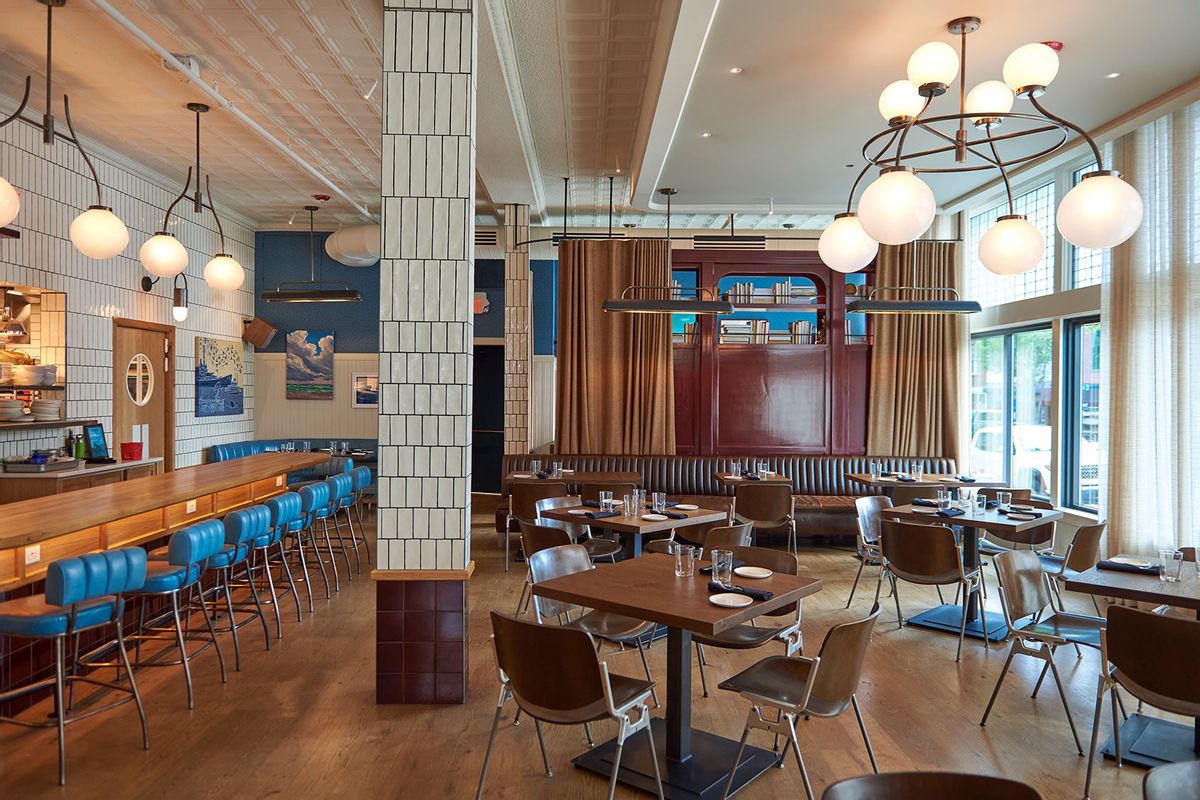In everything from live music to the restaurant industry, North Carolina has had a bit of a renaissance in recent years. Dean Neff, chef-owner of Seabird in Wilmington, NC, says “We have an incredible diversity in this area – from farmers to foragers and fishers. That makes for a really dynamic place to be cooking.”
In addition to North Carolina, Neff – who was most recently one of only five finalists for the James Beard Foundation’s “Outstanding Chef” award nationwide – is especially passionate about sustainability and seafood. Neff was also a semifinalist for a regional Best Chef award for his former restaurant PinPoint in 2019, as well as for Seabird in 2023.
Seabird, which is only a few years old, is run in conjunction with Neff’s wife, Lydia Clopton. According to the official website, the pair originally met when working at Chef Hugh Acheson’s restaurant in Athens, Georgia, until “the salt water beckoned them to North Carolina’s coast,” with Neff as co-owner/chef and Clopton as pastry chef. Now, at Seabird, the duo “honor the seasons and the seaside food culture so unique to Wilmington.”
Recently, Salon Food had the opportunity to chat with Chef Neff and were fortunate to discuss farmers, fishers and foragers, sustainability and local ingredients, working closely with his wife, why he cooks and what’s next for North Carolina, for Seabird and and for Neff, specifically.
Chef Dean Neff (Baxter Miller)
The following interview has been lightly edited for clarity and length.
The Seabird menu is stunning! I’d eat every single item with reckless abandon. Are there any particular dishes you’re especially proud of? Or one that is immensely popular?
I’m really proud of our Catfish & Oyster Pie. It’s a great example of taking an idea from somewhere else and making it relevant to the NC coast. I took inspiration from a friends’ fish pie recipe. Vic is British and this recipe is from her sister in London. We used this idea and made it local to Wilmington using oysters, NC catfish, smoked cream infused with celery, cabbage and citrus. We added a potato pastry crust on top and baked it in a bowl that was handmade for us by an incredibly talented ceramicist, Leanna McQueen. We serve it with a ton of fresh herbs to tear into it and add a freshness. It’s a hearty, comforting dish and has been on our menu since opening day.
“As sure as the changing tide, Seabird’s menu will push the conversation forward on procuring local seafood and celebrate the seasonality while finding the best methods in fishing, aquaculture and farming. The food will be creative, seasonal, fresh and uniquely Wilmington.” What exactly does that mean?
We work with local farmers, fishers and foragers and are always open to what they bring us each day. We leave it to them to dictate the menu, rather than demanding what we need in the absence of knowing what they’re finding in the marsh, ocean and pasture. We really are letting them drive our menu at Seabird. And we’re open to different ingredients that are every bit as fun as the common ones. We intentionally leave room in our process to highlight those ingredients, because those are the ones that give Seabird a sense of place and make it so unique to Wilmington.
It’s all about being true to the stories and food that are brought to us. We think of food as a way of having conversations with people and learning more about the community. For example, Ana Shellem is a coastal forager, who regularly brings us these gorgeous wild mussels and recently discovered tulip snails . . . as a result, we’re now talking to our guests about this ingredient that no one has seen before and it invites conversation about Ana and her work as a coastal forager.
Lori Feezor, of Preservation Point, brings us Cucuzza squash, micro tomatoes and different types of hibiscus. She’s able to grow what she wants and what’s exciting and meaningful to her and we’ll buy anything she’s growing. So we end up sharing all types of rare herbs, sheep’s sorrel, unusual peppers and so much more with our guests.
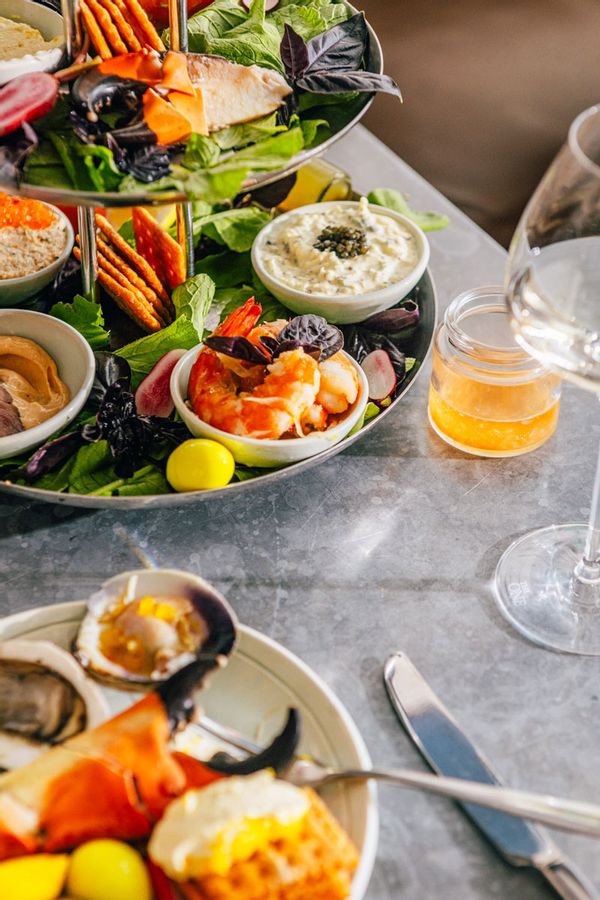 Seafood tower, Seabird (Baxter Miller)
Seafood tower, Seabird (Baxter Miller)
Want more great food writing and recipes? Subscribe to Salon Food’s newsletter, The Bite.
Congrats on the James Beard nomination! How validating was that?
What it solidified is what it means to be a community restaurant and to be representing a community. It made me feel really grateful for all the relationships we have with everyone we work with. It’s about our guests, our team, our farmers, fishers, foragers, as well as about our food bank, farmers’ markets and contractors. It’s about all the many people who contribute to what do on a daily basis. It’s about all of us working together.
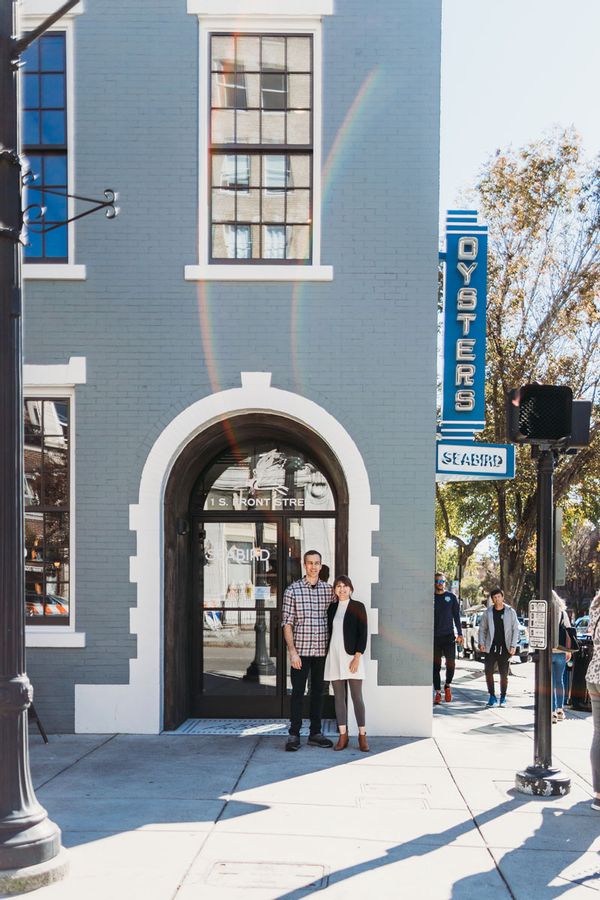 Dean Neff & Lydia Clopton (Mallory Cash)
Dean Neff & Lydia Clopton (Mallory Cash)
What is it like working so closely with your wife, Lydia?
This work in our food community is really important to us and our relationship. The more closely we can work together, the better. It’s so important for us to both be involved. We’re more in sync with each other if we’re both involved in all aspects of the business and that brings us together and connects us. It takes so much of our time and bandwidth, so if you’re not bringing your family in, then you’re not seeing your family as much. She is a part of it and our boys are, too. We met through food and have always been connected through food. She is really smart about so many aspects of this business; she’s a sounding board for me.
Do you have a number one favorite ingredient to work with?
Tuna is so versatile and fun to work with. There are so many different things you do with it. And it’s so satisfying to eat! It takes smoke well. It’s great for low and slow cooking, as well as raw preparations, as well as poaching in olive oil, such as in tonnato. And sometimes, but less often, we sear it. It’s always on the menu in one or more preparations! We mostly use yellowfin tuna. On rare occasions, we get bluefin tuna that’s been raised sustainably and with that fattier tuna we’re able to do some different things. Working with people that you trust and know about where your fish is coming from is critical to ensuring we’re working sustainably. We work with Locals Seafood for most of our tuna.
What’s next for you and for Seabird?
At Seabird we will continue to focus on sustainable seafood and all the fun ways we can put that on the plate.
What’s next for me? I’m looking at growing our business and expanding into new things. And doing it in a way that’s going to help us think about our entire time and support careers for our team and their future. We’re looking at Wilmington in the near future and maybe other areas down the road.
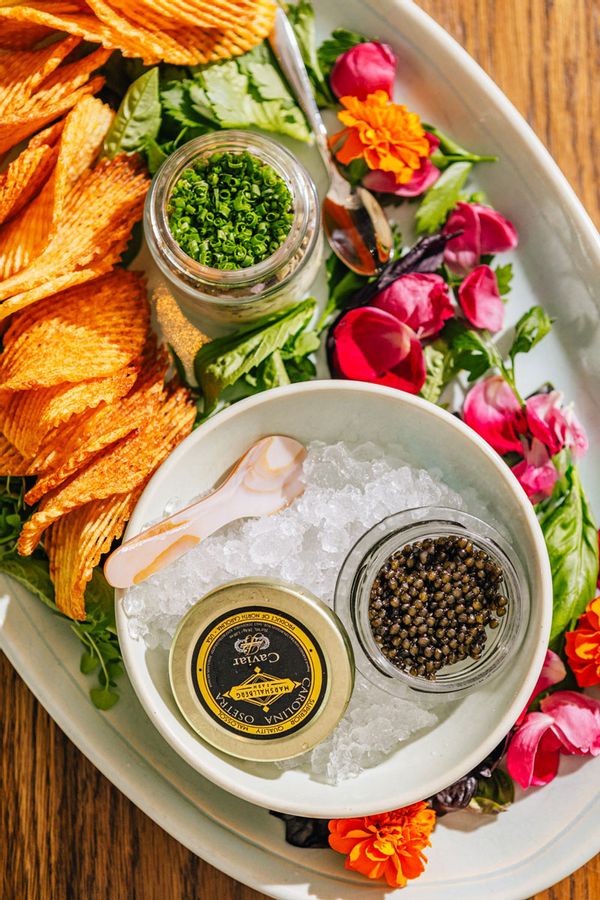 Caviar service, Seabird (Baxter Miller
Caviar service, Seabird (Baxter Miller
Tell me a bit about your history in the industry?
I’ve created a career in independent restaurants. Through that, I’ve been able to work with a lot of great chefs and smaller farmers, foragers and fishers. Those connections and relationships build on each other. And I’ve had the opportunity to work on a small enough scale that we were able to work with really exciting ingredients. That is part of the inspiration and has kept me cooking as long as I have. And it was incredibly beneficial to have had those experiences early on.
Getting a business degree gave me more confidence about opening a business on my own and being a community focused business. Volunteering in our community for organizations that meant something to us has been a big part of our business. Being with independents, all the while working with these community organizations, gave me perspective on where I wanted to go and how I wanted to model my version of an independent restaurant in the future.
I recognized the importance of relationships and that this was the first part of opening a restaurant, especially as someone new to a community. Meeting the people involved in the organizations which make sure people in the area are fed and nurtured. Meeting people passionate about hospitality, food, beverage. Meeting the people at the farmers markets. All of these experiences from 5 and Ten in Athens with Hugh Acheson to Rhubarb in Asheville with John Fleer informed my goals and then we were able to bring that to Wilmington and create that for ourselves and our business here.
Why do you cook? What stands out for you as a formative moment that got you into cooking or food at large?
I don’t think there’s any one moment. It’s something that’s been part of my soul always. Something I’ve always done. Ever since I was very young, I wanted to be in the kitchen. I remember obsessively learning to fry chicken at 7 years old and failing. But I always felt comfort in cooking. It’s the way I express love. It’s my language. It’s where I’m comfortable. Now even when I go home for Thanksgiving, I can’t stay out of the kitchen. I prefer to be in the kitchen, always.
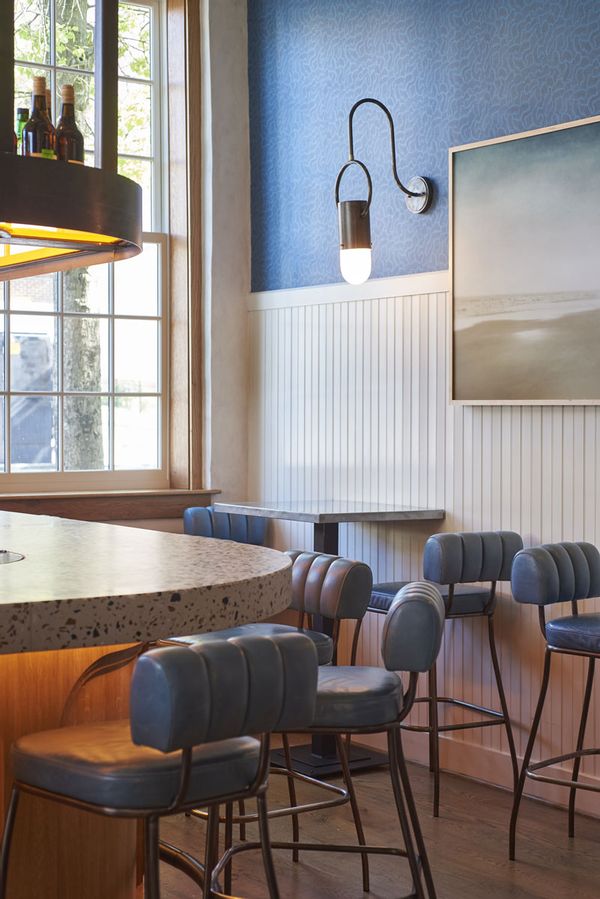 Seabird interior (Doug Young) What is your favorite cooking memory?
Seabird interior (Doug Young) What is your favorite cooking memory?
I recently had a pretty special experience with friends, cooking on the barrier islands, off the coast of North Carolina. We went out on the boat together and were able to forage and harvest ingredients in the marsh and ocean and then pulled up to a barrier island and set up our portable grill and made really fresh dishes with the mussels, fan clams and nepales we’d found. It reminded me of being a little kid, when we used to do this with our family on Tybee Island, near Savannah.
And a few years ago, we started a ritual of making strawberry rhubarb pie with our boys. We’ve been doing it every Spring. We go and pick the berries and rhubarb with our boys who are 2 and 4 years old and then make the pie with them each year. We’re hoping this will be something we keep doing with them. And this year, our pie was just so amazing. It’s fun and simple but you get your hands dirty and it gives them something they can really focus their intense energy on. My son James said it was the best pie he’s ever had. And I agreed.
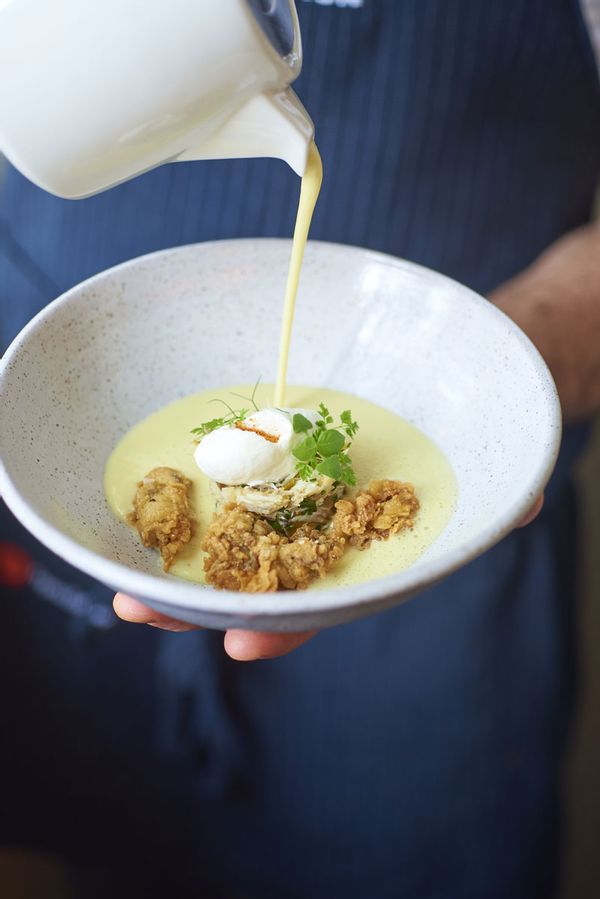 Corn and coconut soup, Seabird (Doug Young)
Corn and coconut soup, Seabird (Doug Young)
What’s your biggest tip for cutting down on food waste?
One unique tip is the power of cooking and storing ingredients in olive oils and other fats. From mushrooms to tuna and chicken legs. We preserve them with a little salt & spices and cook & preserve it in olive oil. You can keep this in the fridge. Confit’ing is the technique and it’s so versatile, but not well known or used. We also use chicken fat, duck fat and coconut oil.
How do you practice sustainability at Seabird?
The number one way is working with producers who are also practicing sustainability. Finding the people who you trust who are doing things for the right reasons. Being able to communicate the information and stories and processes to our guests so they understand why – for instance, tilapia farming is different than farming sturgeon in NC. Why our catfish farmers’ practices are different and much better now than they used to be. There are so many new ways of farming, like aquaculture.
There are a lot of preconceived, bad ideas about seafood farming. It’s important that we can speak to why we are not serving flounder and have speckled sea trout instead. And why we know farmed oysters are now of high quality. Being able to communicate this, but also being open to constantly learning and being aware because new practices and ways of thinking are constantly evolving. It’s a process, it’s a journey and you have to keep learning.
Communication with our team about their needs and goals is also incredibly important. We work hard to maintain business hours that aren’t too long and unsustainable for our team. We’re always trying to find ways to be better at this. We have communication channels open so we really know what our team thinks. It’s important to always be working to create a great culture for our team. It’s up to us to set the intention, but it’s not for us to say exactly what that culture is. It’s up to our crew to create that. As a business owner of just one restaurant, we’re going to be more sustainable as we grow and have multiple opportunities for our team to grow and thrive.
You’ve had some amazing accolades over the years. What’s next for you, in an ideal world?
Ideally, we will continue to strive for finding ways of being in this business and cooking that includes our family more. That could involve farming or cooking classes. Finding new business ventures that will be even more inclusive.
I’m always thinking about a business that is experience-based where we’re bringing together farming, a bake shop and having experiences in food based around that and based around our family spending time together. I’m thinking of our kids as they grow and how to have those experiences for our family.
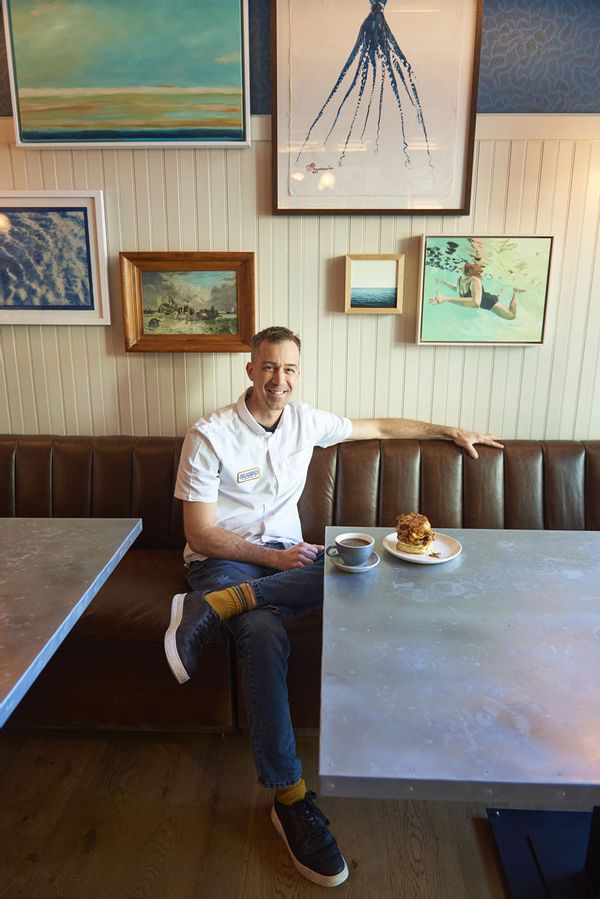 Chef Dean Neff (Doug Young)
Chef Dean Neff (Doug Young)
How have you seen the North Carolina food scene grow in recent years? It seems to be becoming a real “hot spot,” if you will.
North Carolina’s oyster farms are a great example of how vibrant our food scene is now. In 2014 when we moved here, there were about 3 to 5 oyster farms in the region; now there are more like 70! People have discovered Wilmington through our ingredients. It’s been eye-opening for chefs and travelers.
We have an incredible diversity in this area – from farmers, to foragers and fishers. That makes for a really dynamic place to be cooking.
Wilmington seems to be the center of that in NC. And this state is large and it offers a lot of diversity from the east to the west. Asheville has always had such a rich and self-sustaining food scene made up of brewers, cheese makers and farmers. In Wilmington, it’s the fishing scene that is so diverse and wonderful.
Read more
about this topic
